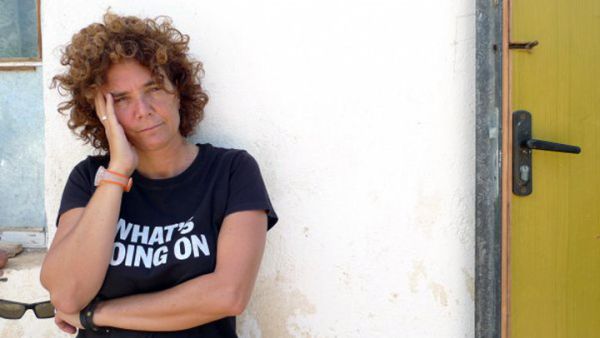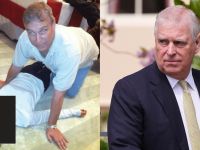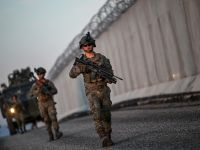It’s miserable being a refugee in Lebanon. This is widely known – thanks to the well-documented experience of Palestinian refugees first displaced here in 1948. Naturally the challenges confronting women in refugee communities – especially when these are impoverished and ruled by conservative cultural mores – are unique, if not more difficult.
“Not Who We Are,” the new film by veteran Lebanese documentarian Carol Mansour, illustrates the plight of five women forced to reside in this country due to the outbreak of civil war in Syria.
Mansour’s film is premised on a few bleak statistics. Worldwide, for instance, it is now more dangerous to be a woman or a child in a conflict situation than it is to be an actual combatant.
In February of 2013, displaced Syrians became the fourth-largest refugee population in the world. U.N. estimates suggest that by the end of this year, there will be 1 million registered Syrian refugees in Lebanon, some 20 percent of the country’s population. A large number of these people are women.
Working with research marshaled by Muna Khalidi, Mansour assembled five women from disparate parts of Syrian society, and asked each to depict her proscribed existence in Lebanon, what she has lost and what this entails. These stories are distressing, if buoyed by resilience.
Mansour has arrayed her five informants in a manner likely to speak to an international audience of middle class urban intellectuals – the demographic more likely to give a damn about this region or to be employed by (or fund) international NGOs.
She begins with Afraa, a secular university grad from Aleppo, and concludes with Siham, a Palestinian social worker from Damascus’ Yarmouk Camp. Grounding the discussion in the lived realities of Syria’s rural, culturally conservative majority are Umm Omar, Umm Raed and “Samar” – women whose families have settled precariously in rural Lebanon.
Afraa is a 27-year-old art school student who relocated to Beirut after she was detained for 29 days, for little reason. She lives in a group house with a cluster of artistically minded young people from Aleppo and Damascus, including her sister.
She and her housemates offer a sketch of how this demographic is adjusting to the extremis of displacement.
Afraa says she doesn’t mingle much with Lebanese nationals because many of them have issues with Syrians; none of her housemates professes any love for Beirut.
Asked how her parents feel about one of her housemates being a man (an old pal from Aleppo), Afraa reflects upon how the crisis is tearing families apart and forcing people to cluster in different social groups. Before opposition protests began, Afraa’s sister explains, she had worn hijab. She shed it, in part, because people began to describe Syria’s youth revolt as an Islamist one.
Umm Omar and Umm Raed are young mothers (23 and 22 years of age, respectively) too destitute to rent accommodation in the Bekaa Valley and forced to relocate several times to avoid flooding. These women are raising young families from what money their husbands can make from day of labor and ever-diminishing U.N. aid supplies, their conditions made more squalid by the substandard utilities the Lebanese state provides its citizens outside the capital.
The woman who asks to be known as Samar is a 36-year-old native of Zabadani. In Mansour’s ensemble of depressing testimonials, Samar (whose face is obscured throughout) provides the emotional heart of the film.
For this mother of five with an ill husband, the financial weight of supporting her family is so burdensome that she’s been forced to negotiate early marriages for her to oldest daughters – 16-year-old Iman and 14-year-old Hanna.
She made this choice against her better judgement, Samar says, as she wanted her daughters to acquire some sense of themselves before marriage, through education. She confesses that she hasn’t yet brought herself to instruct her daughters on what to expect on their wedding night.
Samar’s condition is not uncommon among Syria refugee families. In fact it also replicates a pattern of early marriage among women from poor families in Lebanon’s Palestinian refugee community.
Mansour anchors her film with the affecting story of Siham, who straddles Afraa’s secular urban experience and the more proscribed horizons of Umm Omar, Umm Raed and Samar.
A 37-year-old mother, Siham has two children from an early marriage and two little girls from her second marriage to Ghassan Shahabi, who opened her world for her. She and her youngest daughters left Yarmouk after a sniper killed Shahabi during the rebels’ siege of the camp.
She went to the Western Bekaa Valley because a friend there opened his house to her, but could find no work. As a Palestinian resident of Syria, her position in Lebanon was more difficult. UNRWA informed her she could only remain in Lebanon legally for a week. UNHCR told her that, as she is Palestinian, they couldn’t help her. She had to wait some months for Lebanese General Security to decide on her status.
Once she found a job in her field, Siham moved to Beirut and found that room rentals were inflating overnight from $200-$450.00 a month. She took a place in Shatila, expecting to be welcomed among Lebanon’s Palestinians. Instead she was alienated from them.
“Their sufferings have been so great,” she observes, “that they can no longer stand by anyone else.”
Like some other people Mansour has spoken to for this film, Siham is not enamoured of the Lebanese capital.
“I hate Beirut,” she says simply.
The worth of “Not Who We Are” lies not in the surfeit of emotion that bubbles to the surface during informant testimonials but in the tentative sketch they provide of the social dysfunction marking Lebanon’s latest epic of displacement.
Naturally the film’s focus on feminine experience means it will not answer all the questions provoked by the plight of Syrian refugees. At no point does the film inquire about the cast’s political loyalties; arguably their condition would be little affected by their politics.
The complex, and politically contentious, question of Syrian men’s refugee experience in Lebanon is necessarily left to one side. Questions of how men negotiate Lebanon’s complex political landscape (which echoes Syria’s own) – and how that plays itself out in the informal economies of labor and the political economy of militancy – must still be addressed. Urgently so.
“Not Who We Are” screens at Metropolis Cinema-Sofil Monday evening at 8 p.m. A Q&A will follow with Mansour and Heinrich Boell Foundation director Dr. Bente Scheller.








